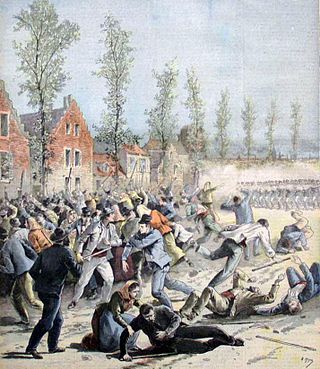
Stigmergy is a mechanism of indirect coordination, through the environment, between agents or actions. The principle is that the trace left in the environment by an individual action stimulates the performance of a succeeding action by the same or different agent. Agents that respond to traces in the environment receive positive fitness benefits, reinforcing the likelihood of these behaviors becoming fixed within a population over time.

Collective action refers to action taken together by a group of people whose goal is to enhance their condition and achieve a common objective. It is a term that has formulations and theories in many areas of the social sciences including psychology, sociology, anthropology, political science and economics.

A social movement is a loosely organized effort by a large group of people to achieve a particular goal, typically a social or political one. This may be to carry out a social change, or to resist or undo one. It is a type of group action and may involve individuals, organizations, or both. Social movements have been described as "organizational structures and strategies that may empower oppressed populations to mount effective challenges and resist the more powerful and advantaged elites". They represent a method of social change from the bottom within nations.

Civil disorder, also known as civil disturbance, civil unrest, or social unrest is a situation arising from a mass act of civil disobedience in which law enforcement has difficulty maintaining their authority.
In social psychology, social loafing is the phenomenon of a person exerting less effort to achieve a goal when they work in a group than when working alone. It is seen as one of the main reasons groups are sometimes less productive than the combined performance of their members working as individuals. Research on social loafing began with rope pulling experiments by Ringelmann, who found that members of a group tended to exert less effort in pulling a rope than did individuals alone. In more recent research, studies involving modern technology, such as online and distributed groups, have also shown clear evidence of social loafing. Many of the causes of social loafing stem from individual members' feeling their individual effort will not matter to the group.
In sociology, social action, also known as Weberian social action, is an act which takes into account the actions and reactions of individuals. According to Max Weber, "Action is 'social' insofar as its subjective meaning takes account of the behavior of others and is thereby oriented in its course."

A decentralised system in systems theory is a system in which lower level components operate on local information to accomplish global goals. The global pattern of behaviour is an emergent property of dynamical mechanisms that act upon local components, such as indirect communication, rather than the result of a central ordering influence of a centralised system.
Relative deprivation is the lack of resources to sustain the diet, lifestyle, activities and amenities that an individual or group are accustomed to or that are widely encouraged or approved in the society to which they belong. Measuring relative deprivation allows an objective comparison between the situation of the individual or group compared to the rest of society. Relative deprivation may also emphasise the individual experience of discontent when being deprived of something to which one believes oneself to be entitled, however emphasizing the perspective of the individual makes objective measurement problematic.

Social movement theory is an interdisciplinary study within the social sciences that generally seeks to explain why social mobilization occurs, the forms under which it manifests, as well as potential social, cultural, and political consequences, such as the creation and functioning of social movements.

Value-added theory is a sociological theory, first proposed by Neil Smelser in 1962, which posits that certain conditions are needed for the development of a social movement.

Deviance or the sociology of deviance explores the actions and/or behaviors that violate social norms across formally enacted rules as well as informal violations of social norms. Although deviance may have a negative connotation, the violation of social norms is not always a negative action; positive deviation exists in some situations. Although a norm is violated, a behavior can still be classified as positive or acceptable.
A boycott is an act of nonviolent, voluntary abstention from a product, person, organization, or country as an expression of protest. It is usually for moral, social, political, or environmental reasons. The purpose of a boycott is to inflict some economic loss on the target, or to indicate a moral outrage, to try to compel the target to alter an objectionable behavior.
Political opportunity theory, also known as the political process theory or political opportunity structure, is an approach of social movements that is heavily influenced by political sociology. It argues that success or failure of social movements is affected primarily by political opportunities. Social theorists Peter Eisinger, Sidney Tarrow, David S. Meyer and Doug McAdam are considered among the most prominent supporters of the theory.

In social science, agency is the capacity of individuals to have the power and resources to fulfill their potential. For instance, structure consists of those factors of influence that determine or limit agents and their decisions. The influences from structure and agency are debated—it is unclear to what extent a person's actions are constrained by social systems.
Advocacy groups, also known as interest groups, special interest groups, lobbying groups or pressure groups use various forms of advocacy in order to influence public opinion and ultimately policy. They play an important role in the development of political and social systems.

In the philosophy of mind, collective intentionality characterizes the intentionality that occurs when two or more individuals undertake a task together. Examples include two individuals carrying a heavy table up a flight of stairs or dancing a tango.

Activism consists of efforts to promote, impede, direct or intervene in social, political, economic or environmental reform with the desire to make changes in society toward a perceived greater good. Forms of activism range from mandate building in a community, petitioning elected officials, running or contributing to a political campaign, preferential patronage of businesses, and demonstrative forms of activism like rallies, street marches, strikes, sit-ins, or hunger strikes.

Direct action originated as a political activist term for economic and political acts in which the actors use their power to directly reach certain goals of interest, in contrast to those actions that appeal to others, by, for example, revealing an existing problem, highlighting an alternative, or demonstrating a possible solution.

In the sociology of crime, the term collective efficacy refers to the ability of members of a community to control the behavior of individuals and groups in the community. Control of people's behavior allows community residents to create a safe and orderly environment. Collective efficacy involves residents monitoring children playing in public areas, acting to prevent truancy and street corner "hanging" by teenagers, and confronting individuals who exploit or disturb public spaces.
Group consciousness in political science refers to the phenomenon in which members within a social identity group become aware of how their group identification impacts their position in society, and therefore come together to pursue collective action to advocate for their shared interests. Group consciousness requires two necessary preconditions: group membership, and group identification. Group membership is the 'objective' belonging within the group, while identification refers to the subjective psychological importance of the group to the member. Group consciousness has been studied, for example, among women, Hispanic and Latino Americans, and Muslim Americans.








